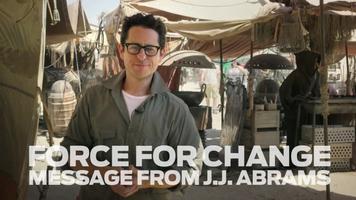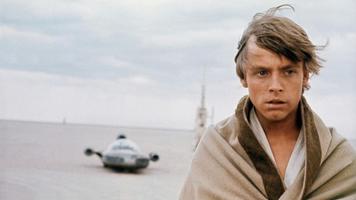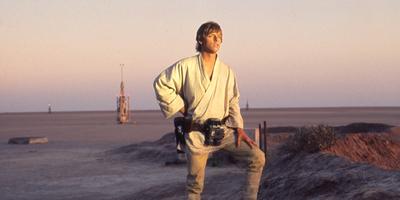Why Do We Care About The Star Wars Sunset?
Posted by Dustin on March 17, 2017 at 01:13 PM CST
One of the most iconic moments from Star Wars is where Luke watches the binary sunset on Tatooine. It’s director J. J. Abram’s favorite scene out of all the Star Wars films, and the theme that this scene uses has been incorporated in the rest of the movies ever since, even in the trailers for Rogue One. But what about this scene is so stirring? What makes a film director say it’s his favorite moment from the franchise, and what makes everyone in the room go quiet when it plays?
There have been many thoughts on why we should care about Star Wars, and even in-depth discussions on why this scene alone is so amazing. And there are undoubtedly many reasons why the scene came together so well and why it resonates with different people, from costume and cinematography to lighting and, of course, music.
However, there must be some particular aspect of this scene that strikes the core of most, if not all, of those who watch it. Without something deeper going on for most viewers, this scene could only be aesthetically pleasing at its best, and Star Wars might not have taken off quite the way it did forty years ago. Upon inspecting what we know about human happiness and the background of the scene, there’s actually a succinct reason for us to still enjoy this moment after four decades since its showing:
We care because of our desire to help others.
Human Happiness:
To fully understand why this rather abstract concept helps us appreciate the sunset, we first need to understand a little bit more about how humans function. It seems fairly intuitive to guess that most humans are happier and more fulfilled when they believe they’re making a positive impact on other people—however, this isn’t just a wild guess supported by Huffington Post articles and editorials from Berkeley. This is something that seems to be repeatedly confirmed by serious scientific studies, including those showing positive effects on mental health from volunteer work, increased donations when donors feel more directly connected to those affected by charities, lowered blood pressure and mortality rates correlated with volunteerism, and conjectured positive feedback loops between prosocial spending and overall happiness.
However, few of us need to hear these studies; even when we’re not making a conscious effort to increase well-being, we’re still constantly grounded with this underlying principle of aiding conscious creatures. This is why so many human beings justify what they do by describing their actions as helpful ones. Whether they say that the “morality” of actions is determined by obeying one god or principle over another may cause some disagreements, but rarely do people guard the core of their arguments without saying that they are improving someone’s well-being. And the most widely discussed ethical systems—from Utilitarianism to Kantian ethics—tend to have conscious beings’ welfare at the forefront of their guidelines. Even on both ends of something as dichotic as immigration policies, one side will claim protecting certain human lives while the other will claim benefiting others—both arguing that they are, in the end, helping humanity. Thus, for almost all people, both our happiness and our reasoning is dependent on whether or not we are improving others’ well-being. This foundation—of constantly valuing what helps people—is what drives some of our deepest desires and decisions, whether we consciously consider it or not.
Our New Hope:
After acknowledging how deeply helping others affects ourselves, one can see several bits of A New Hope that capitalize on this facet of human nature. Within the first shot of the movie, we see that there is some kind of interstellar conflict. Soon, we learn that there are two very different sides invested in this battle: the good, who are the underdogs that fight to save the galaxy; and the evil, who are the oppressors that crack people’s necks and destroy ambassador’s ships to protect their superweapons. Very quickly, we come to understand that there is a large distinction in this film between the morally good and bad, and that supporting one over the other will benefit entire worlds of people.
Then we see that Luke wants to join the good side. Just before the binary sunset, we watch him discussing how his friends have already gone off to fight with the Rebellion, and that he desires nothing more than to do the same. Of course, later films show that Luke will learn that he can’t paint either sides of the conflict with just “good” or “evil,” and even Rogue One displayed how imperfect the Rebellion was, but looking past this mild naivety, the audience understands that Luke wants to do good. Though we don’t fully understand the specifics of how he’ll do this, we accept that, at his core, he wants to improve the galaxy and help others.
Finally, we also get to see Luke’s mediocrity, and this helps us relate to the longing for a greater purpose that he feels. As Luke performs menial tasks and chores, grumbles about the harvest and his uncle’s broken promises, and even plays with a model ship, he can frustratingly, albeit possibly subconsciously, remind us of ourselves. The majority of our daily activities don’t involve blowing up a tyrant’s weapon, solving world hunger, or even marginally improving someone else’s life, and so we can more easily connect with Luke when he kicks aimlessly at the ground and complains about not joining something bigger than himself.
Each of these details—the pitting of the good against the bad, Luke’s inherent desire to help others, and the main character’s ordinariness resembling our own—all vault us toward connecting with what Luke sees on that reddening horizon: a chance to get out there and finally do some good. Though we don’t analyze the scene as its playing, the reason we emotionally connect with the moment is because we don’t need to analyze: we’re already cognizant that there are terrible things happening, we’re hoping that there must be something out there to stop these awful events, and we’re also painfully aware of our own mediocrity when compared to these huge conflicts.
Thus, when the music crescendos and our hero stands before us in pure white, watching yet another blood-red sunset burn away before his eyes, we intuitively understand and relate to what Luke’s hoping for without having to read the underlying message at the bottom of the screen. Despite the odds against us, despite the boring chores and the obstacles blocking us from our ability to actually fix something or save someone, we still want to be involved in something greater, in something that actually matters and helps people. That’s what we see when Luke looks out at those two falling suns. That’s why we care.
Our desire to do good is an extremely powerful motivator. And because of the carefully laid details in A New Hope, we can see that there is much to be done to help those around us and around Luke. When he sees the binary sunset, he isn’t just looking out to the unknown, to the stars he wants to explore, or to some kind of professional advancement or purely enthralling adventure—he’s looking to a future in which he will help others. And because we’re dreaming of that same future, that’s why the room goes silent when John Williams’ strings crescendo and the suns dip beneath the horizon.
This article was written by J.Q. Ronan, and published here with his permission. You can follow his blog right here! He's Also on Twitter and Facebook! If you are interested in sharing original content here on TheForce.net please contact us!
Related Stories:
* Star Wars Opposite Quote Game
* Star Wars Quote Game: PORG Edition!
* Star Wars Quote Game (version 5.0)
* Mini-Games Challenge (Now Open For NEW 2024 Challenges!)
* Star Wars Quote Game: PORG Edition!
* Star Wars Quote Game (version 5.0)
* Mini-Games Challenge (Now Open For NEW 2024 Challenges!)












